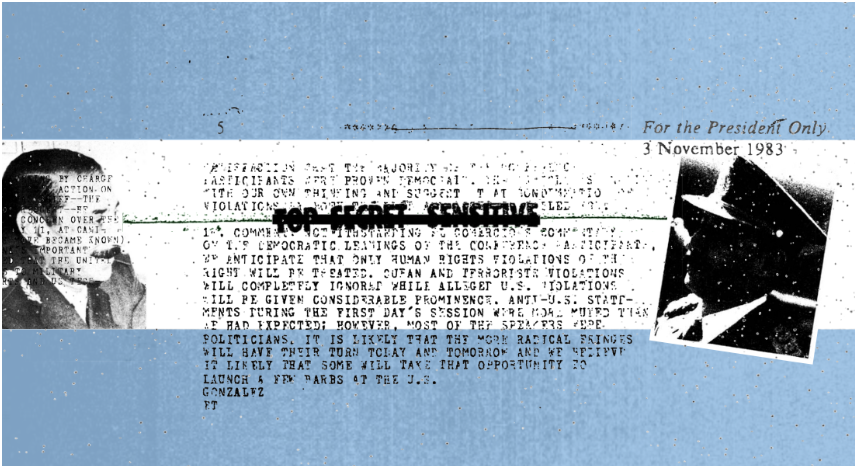Argentina Declassification Project: Scope of Research
A Presidential Tasking
The Argentina Declassification Project, which spanned 2016 to 2019, originated with a personal request from Argentine President Mauricio Macri for the declassification and release of US government records to assist in the pursuit of truth and justice for those victims of human rights abuses in Argentina.
The search for records began with a Presidential tasking to over 16 agencies and departments within the Executive branch, including the Presidential Libraries. In June 2016, federal agencies were directed to search for, identify, and evaluate classified records for public release that may shed light on human rights abuses, terrorism, and acts of political violence committed in Argentina during its "Dirty War."
In all, the Argentina Declassification Project has encompassed close to 32,000 hours and reflects the diligent work of over 380 individuals across the U.S. Government. This effort has produced 7,035 documents and entailed the review of 49,000 pages of responsive material.
The following is documentation of our research and review process.
Outlining the Major Tasks
This effort encompassed five major tasks, building on an earlier, narrower, declassification project completed by the Department of State in 2002, through which the U.S. Government provided records addressing human rights abuses committed in Argentina during its "Dirty War," pursuant to Article 9 of the Mutual Legal Assistance Treaty:
- Make records from the Gerald R. Ford, Jimmy Carter, Ronald W. Reagan, and George H.W. Bush Presidential Libraries available to the public. Records from the Presidential Libraries are of great historical interest, given their importance in documenting U.S. decision-making at the highest level. Archivists at the four Presidential Libraries will search their holdings for relevant classified documents and provide them for interagency review (In addition to the records of Presidents Ford, Carter, and Reagan, archivists also identified several documents from Vice President George H.W. Bush’s files at the George H.W. Bush Presidential Library).
- Make responsive portions from the President’s Daily Brief available to the public. The PDBs are considered the Intelligence Community’s most important product, providing information on the most significant global national security issues. The release of the relevant portions of these PDBs is only the 3rd time in history PDBs have been declassified, and the first-ever Carter-era and Reagan-era PDBs publicly released.
- Make previously withheld information from the Department of State’s 2002 declassification project available to the public. While the Department of State previously declassified its cables and records that provided evidence of human rights abuses, it withheld some information for national security classification or statutory-based restrictions. The Department of State and other relevant agencies will re-review these cables and records in an effort to publicly release additional information.
- The U.S. Government will make available to the public records related to human rights abuses that occurred between 1975 and 1984 in Argentina. This would be a comprehensive search of hundreds of federal records series and hundreds of thousands of pages to identify relevant individual documents for review and potential release, with the Office of the Director of National Intelligence coordinating an interagency public access review of relevant records.
- The Historian’s Office at the Department of State will make the 1977-1981 Foreign Relations of the United States South America volume available to the public.
Formulating a Research Plan
Within each department or agency, a responsible office was identified and each department or agency, in turn, developed a work plan in consultation with records managers, historians, Freedom of Information Act specialists, declassification specialists, policy analysts, and information technology professionals. Each department or agency was also required to document information about the process used to search holdings for responsive records.
In consultation with historians, the National Security Council provided agencies with a comprehensive list of key terms to use in their search for responsive records. Searches were then tailored to reflect individual agency missions and specific record-keeping systems, and focused on those records series deemed most likely to contain responsive records in paper files and electronic record files, on both classified and unclassified systems.
In determining whether a record contained responsive information, agencies evaluated records erring on the side of inclusiveness, as the Presidential tasking mandated. Records determined to be responsive were reviewed for public access on a word-by-word basis. Information release standards followed policy instruction found in section 3 of Executive Order 13526, “Classified National Security Information.”
Research Narratives
The following narratives provide information on participation and detailed summaries of the actions undertaken by individual participating departments or agencies in response to the Presidential Tasking from the Executive Secretary of the National Security Council on June 13, 2016. It directed Executive branch departments or agencies to search their holdings for records relating to human rights abuses committed in Argentina between January 1, 1975 and December 31, 1984, and to review responsive records for potential public access.
Included in these narratives is information on the staffing, scope and, methodology of the search conducted by each department or agency, as well as a summary of the review procedures and information on the quantity of documents identified by each agency.
Explore the Argentina Declassification Project:
OVERVIEW & ORIGINS
SCOPE OF RESEARCH
HISTORICAL BACKGROUND
RESPONSIVE RECORDS
RETURN TO HOME
